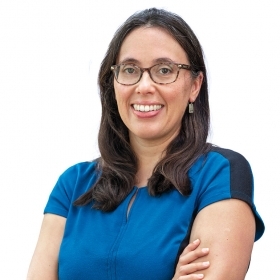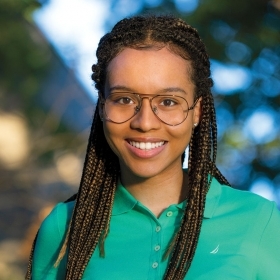Photo by Lisa Abitbol
Where many professors would see a challenge—a compressed seven-week term, taught both in person and online, in the midst of a pandemic—Josh Lambert saw an opportunity.
Lambert, the new Sophia Moses Robison Associate Professor of Jewish Studies and English, had long wanted to teach a course about comics—from the Sunday morning “funnies” of yesteryear to contemporary graphic novels—paying particular attention to representations of minorities. “The ‘funny pages’ feels like an absolute misnomer for them,” he says of those early comic strips. “The actual jokes don’t land, ever, and they’re not funny at all. In fact, they are racist and misogynist.”
But teaching the interplay of text and graphics posed some logistical problems. How to get everyone on the same page, literally, when talking about comic frames? Coincidentally, the technology faculty relied upon to teach remotely during the pandemic provided a solution. Using Sakai, the College’s learning management system, and Perusall, a “social e-reader” platform, Lambert was able to make available all the visual content for the course in a way that could be easily bookmarked, annotated, queried, and responded to by everyone in the class. “In a normal semester I would feel weird having my students do all of their reading in an online system, but because of the pandemic, I thought we could use these digital materials … to do an intense close reading.”
For one assignment, he had the students comb through editions of two popular late-19th century humor magazines, Puck and Judge, and comment on the representations of minorities.
“What we have now is 20 posts and many, many responses that are just a museum of atrocious representations that really make the point,” he says.
Although new to campus this fall, Lambert is no stranger to experiments in teaching. For nearly a decade, he was the educational director at the Yiddish Book Center in Amherst, Mass., where he developed courses in Yiddish language and literature that ranged in length from three to seven weeks. He also kept busy with research, publishing a book on Jews, sexuality, and sexual freedom of expression. He is currently finishing up another book about the influence of Jews in the American publishing industry. “Anyone who cares about 20th-century American literature, whether you particularly care about Jewish writers [or not] … you need to pay attention to the role of Jews in the publishing system because they were so influential in creating the formats for literature and possibilities for what literary culture could be in America,” he says.
That wide-ranging perspective informs how he envisions leading the Jewish Studies program. (Lambert replaces Fran Malino the program’s inaugural chair, who retired in 2018.) “The main role that I see for Jewish Studies is to make the study of Jews and Jewishness relevant, as widely as possible, across the curriculum and to as many students as possible,” he explains. “Whatever you end up studying, it’s important to think in an informed way about the role of Jews in that culture throughout history.”








We ask that those who engage in Wellesley magazine's online community act with honesty, integrity, and respect. (Remember the honor code, alums?) We reserve the right to remove comments by impersonators or comments that are not civil and relevant to the subject at hand. By posting here, you are permitting Wellesley magazine to edit and republish your comment in all media. Please remember that all posts are public.